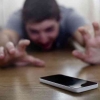According to data from Hootsuite in 2020, there are around 160 million active social media users, and there are around 175.4 million internet users in Indonesia. This shows that the use of the internet is no longer a foreign thing, especially since the Covid-19 pandemic took place, where all activities were transferred to social media and the internet. A U.S. study showed a 25% increase in suicide attempts, mostly from adolescents from 2009 to 2017. Data shows that the use of social media also has a bad influence on mental health, especially for the younger generation. There are so many things that can be found on social media, ranging from useful content to content that can trigger negative things. The most common case experienced when using social media is cyber bullying, where everyone can criticize and blaspheme without showing their true identity. According to research in 2020, during the COVID-19 pandemic, it was recorded more than 6.000 individuals aged 10-18 years old had experienced cyberbullying (Lobe, B. etc, 2020). One in three young people in 30 countries said they have been a victim of online bullying, with one in five reporting having skipped school due to cyberbullying and violence (UNICEF, 2019). Based on the results of the data above, we can take a lesson that unwise use of social media can have a big effect on a person, especially on their mentality. Be wise to use social media and protect those around them from the impact of social media on their mental health.
Depression is a condition in which a person loses mood or worsens mood which is characterized by feelings of deep sadness, hopelessness, or feeling worthless. Prolonged depression can lead to disruption of social relationships and even suicide. Depression can be triggered by many things, one of which comes from social media. Under certain conditions, social media can cause a person to become depressed, especially for those who spend most of their time playing or being active on social media. In this day and age, it is a trend with content creators, where people can show their talents, or their work on social media and be seen by almost everyone in the world. Not infrequently they display their personal lives that don't actually need to be indulged, this can then trigger the onset of depression. Why? Because from the content they make, there must be comments given by netizens, whether it is a positive or negative comment. Not a few malicious people who leave bad comments on other people's sites or content without thinking about the impact that will occur on the account owner. The number of negative comments that continue to repeat will make them feel less good and sad, and eventually refer to a depressive condition. A study says that the less time people spend on social media, the fewer symptoms of depression and loneliness they feel (Hunt MG, Marx R, Lipson C, Young J, 2018). A study conducted in the USA showed an increase in the rate of depression among young people from 8.7% in 2005 to 11.3% in 2014 (Mojtabai, Olfson, & Han, 2016). Among young people, one of the triggers for depression from social media comes from cyber bullying. Cyber bullying is a form of bullying that is usually done through devices such as mobile phones, computers, or game consoles. Cyber bullying is usually done by spreading someone's personal information that aims to demean, bully, or humiliate the person. Cyber bullying can also be done privately via text message or email, but it happens more on public platforms such as social media which has a greater impact. There are so many cases of cyber bullying experienced by young people that lead to depression which results in them becoming traumatized. The things that often happen from cyber bullying are Offensive name-calling (31%), Purposeful embarrassment (26%), Physical threats (14%), Stalking (11%), Sexual harassment (11%), Sustained harassment (11%) (PEW Research Center, 2020). According to a Cyberbullying Research Center study in 2021, it was found that 22.6% of 12-17 year olds in the US have been cyberbullied in the past 30 days. The internet not only provides benefits to facilitate activities, but can also have a bad impact, especially for young people who are often involved in cyber bullying or online crimes, it can also be a threat to victims of cyber bullying. According to dr. Jeff Hutchinson, a juvenile medicine specialist in Washington, D.C., said that cyber bullying and Depression are related, where victims of cyber bullying can experience depressive symptoms such as sadness, insecurity, academic decline, and suicidal thoughts or behaviors. The effects of cyber bullying may be more severe than bullying in schools because victims of cyber bullying cannot escape and cannot identify who the perpetrators are (Nancy Willard, 2007). All the data above show that the level of depression experienced by young people, especially for victims of cyber bullying, will continue to increase if there is no protection or supervision of social media use. The role of parents is certainly very necessary in directly supervising their children's internet use, preventing them from committing online crimes, and controlling what they see or send on social media. Strict security for internet users is also needed so that personal data cannot be spread by others.
There are a lot of teenagers or adults who experience mental health problems, such as anxiety disorders. Anxiety disorders are familiar today, and many consider this mental problem to have no significant effect on the sufferer. But in fact, people who experience health problems have a difficult time and have to regularly visit a doctor to overcome it. Jerkiness is a feeling of discomfort, anxiety, or fear in certain conditions. People who experience an anxiety disorder often find it difficult to control their worry or fear, so it can affect their daily life. GAD or Generalized Anxiety Disorder is a condition that causes sufferers to feel anxious in various situations or problems. People with GAD conditions feel anxious almost every day and keep remembering the last time they felt relaxed or relaxed. The symptoms of the condition are frequent feelings of restlessness or worry, difficulty concentrating or sleeping, dizziness or palpitations. There are so many causes that allow a person to be in this condition, one of which is having a history of stressful or traumatic experiences such as violence, harassment or intimidation. According to data from the World Health Organization (WHO, 2017), it shows that 10-20% of children and adolescents worldwide experience mental health problems. The most common disorders are generalized anxiety disorders and depression (Mental Health Foundation, 2018; Stansfeld et al, 2016). According to the Royal Society for Public Health g Young Health Movement in 2017, the percentage of anxiety and depression increased by 70% in the last 25 years, which is mostly the case in young people. In this case, anxiety is interrelated with the use of social media, when someone does not use social media, they will feel anxious, as well as if someone turns to social media to reduce or relieve the level of anxiety that leads to causing other anxiety obtained from social media. Sometimes, to reduce stress levels, they post on social media as well. People who have anxiety are usually more interested in social media to divert the worries they have or as a 'sedative' (Reed, P., Romano, M., Re, F., Roaro, A., Osborne, L. A., Viganò, C., & Truzoli, R. (2017). Social media can have different effects depending on the user, for some people social media can worsen the feelings of anxiety they have because it usually displays a lot of sensitive content that triggers feelings of anxiety, but for some people social media can also overcome their anxiety by providing content that can entertain them.
Depression and anxiety can refer to suicide. Suicide is a purposeful behavior carried out either to manage or eradicate unbearable levels of pain in one’s present life circumstances (Nero. RL, 2015). And most of the causes come from the uncontrolled use of social media. The amount of sensitive content and cyberbullying on social media can increase negative feelings in a person and lead to suicide. People are very easy to use social modia to discover new things. Social media can increase th suicide risk in several ways while also potentially contributing to suicide prevention. (Centers for Disease Control and Prevention Suicide and self-inflicted injury, 2012). According to 10-years longitudinal study at BYU, a teenage girls age 13 who spent 2-3 hours daily on social media have a higher risk for suicide as young adults. Teenagers who post their personal lives can provide a great opportunity to become victims of the post itself. In this case, Cyberbullying exerts a very large effect in increasing suicidalism in the victim. Although most of them are done online and anonymously, suicides caused by cyberbullying are inevitable and will continue to grow with the development of technology and the times. Many times this issue is taken for granted by people, leaving bad comments such as body shaming, racism, and others greatly affects a person's mentality. This makes a person feel depressed which leads to suicide because they get insults from others through their social media. Cyberbullying and depression usually occur a lot in young people, especially students or even famous artists. Students who experience Cyberbullying greatly affect their level of activity at school and cause fear of entering school and meeting their friends. Cyberbullying can refer to depression, then end up committing suicide because of the pressure it gets. Over 60% of students who experience cyberbullying reported that it immensely impacted their ability to learn and feel safe while at school (Hinduja, 2018). Students who experienced bullying or cyberbullying are nearly 2 times more likely to attempt suicide (Hinduja & Patchin, 2018). The data above shows that these three things, depression, cyberbullying, and suicide are interrelated and related to each other. From Cyberbullying a person can experience depression to suicide. Users who are not wise in using social media never think about the impact of their actions on others. The three things above are actually considered trivial matters and are often called excessive.
People's policylessness in using social media will continue to increase the rate of depression or suicide slowly. Moreover, most of the victims are young people whose mentality still changes frequently and are easily instigated by bad things from cyberspace. One nasty comment from us can lower one's self-confidence. Through this writing, I hope that people will be able to be wise in using social media and not abuse social media for bad things. Parents are also expected to play an important role in monitoring their children's social media. Depression, anxiety, and suicide are small examples of the effects of social media. Be careful in using social media, digital traces will not be easily lost, nor will the effect on victims.











